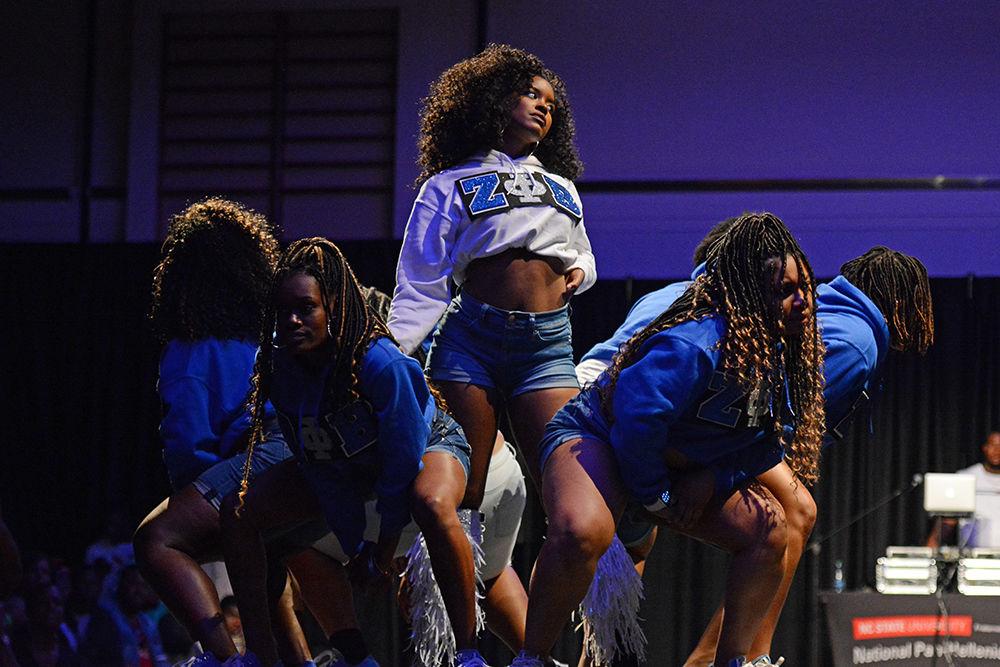
Swathi Karthik
Members of the Zeta Phi Beta sorority perform at the Pan-Afrikan Stroll-Off, hosted by the National Pan-Hellenic Council, on Saturday, April 13 at Talley Student Union.
At NC State, Greek Life is an integral part of the undergraduate student experience. Fraternities and sororities are more than just organizations. They represent communities where life-long friendships are built and memories are made.
With over 28 different fraternities and sororities represented on campus, culturally-based organizations have grown more popular in recent years.
Several of these organizations fall under the governance of councils such as the Multicultural Greek Council (MGC) and the National Pan-Hellenic Council (NPHC).
According to Shelley Brown Dobek, the director of Fraternity and Sorority Life, culturally-based organizations, such as the fraternities and sororities under the MGC and the NPHC, are centered around empowerment.
“When we talk about the fraternity/sorority experience, what we do and why we do it is actually all the same,” Dobek said. “It’s about empowering young men and young women to become the best versions of themselves.”
According to Dobek, culturally-based organizations tend to center around giving back to the community in a myriad of ways.
“What we see is that our culturally-based organizations understand the idea that there was a path created for them to access education and to kind of bring the community forward and create that sense of uplift,” Dobek said. “As fraternities and sororities, they remain deeply connected to those communities so that they continue to provide that path forward for other students, and then also reach back into that community. So where an [InterFraternity Council] might focus their philanthropy on a national cause and raising money and writing that check, and that’s really important work.”
Loulou Batta, the president of the NPHC, said the NPHC is dedicated to serving the nine historically Black Greek-lettered fraternities and sororities on campus through guidance, programming and community outreach.
“Besides being somewhat of the overseeing body for each of the different organizations, most of what we do on NC State’s campus is community outreach,” Batta said. “So outreach in Raleigh by doing community service and then outreach on NC State by being a part of different Black organizations’ events here, or helping out with primarily-Black organizations when it comes to uplifting Black students on campus.”
Originally started at Howard University in 1930, the fledgling organization then consisted of only five founding fraternities and sororities. With its last member joining in 1996, NPHC has worked tirelessly to combat issues over its decades-long history.
“Some of the very same issues that began with NPHC are still going on, especially when it comes to fighting for voting rights, combating voter suppression and fighting for the advancement of Black people through activities like community awareness, education and helping create economic awareness,” Batta said. “Those are some of the very same things that our council was founded on and the very same things that we’re continuing to do. I think right now, it comes back to refining what our purpose is.”
Like many other organizations and clubs at NC State, the pandemic has halted many of the traditions associated with the NPHC.
“Some of our traditions are not able to be held in person just because of COVID, so it’s now getting back to those roots,” Batta said. “What is it that we were made to do? How do we continue to do that in a virtual setting?”
Along with the NPHC, the MCG presides over various fraternities and sororities that focus on cultural representation and diversity.
Jonathan Chen, the president of the MGC, cited his own experience in Lambda Theta Phi, a Latino-based fraternity on campus that is part of the MGC. Chen said anyone is welcome to join MGC fraternities and sororities despite their cultural affiliations, but the groups are focused on empowering their communities.
“This is the same for other culturally-based orgs within our organization,” Chen said. “They might be focused on empowering the Asian American community, or the Native American community, or in the case of Theta Nu Xi, a multicultural sorority, to create multiculturalism.”
Since MGC is a much smaller council, bonds among the council members are much tighter. The council itself is organized into an executive board, with the president and internal and external vice presidents. The council has meetings with the presidents of each organization as well as the executive board where they plan events and ways to improve the council.
The MGC was founded by Theta Nu Xi on March 30 in 1999 and has since grown to nine organizations, with Delta Kappa Delta joining most recently on July 6, 2020, according to Chen. The MGC’s presence on campus in the past two decades has helped many students of differing backgrounds feel welcome.
“It’s also because we felt kind of a need to create a community like this in order to help empower students and also provide kind of a welcoming space because I know NC State is a predominantly white institution,” Chen said. “Organizations like these definitely provide the sense of community for incoming students of color.”
Similar to the NPHC, many of the events planned by the MGC have been halted or have gone virtual. This past Friday, a cultural kaleidoscope event was held virtually by Kappa Phi Lambda, Phi Sigma Nu and Alpha Phi Omega. The event focused on learning about the indigenous tribes of North Carolina and ethnic minorities in Asia.
Other events include an ongoing food drive held by Delta Sigma Iota and Delta Kappa Delta, Sangeet Saghar, an upcoming annual South Asian a cappella competition held by Delta Sigma Iota and a collaborative event between both the NPHC and MGC that discusses the NPHC’s history.
With NC State growing with every academic year, the presence of culturally-based organizations is more important than ever. Understanding the purpose of these organizations can help students feel more connected regardless of their background.